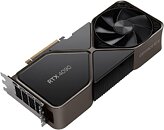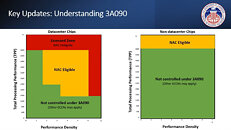- Joined
- Oct 9, 2007
- Messages
- 47,577 (7.46/day)
- Location
- Dublin, Ireland
| System Name | RBMK-1000 |
|---|---|
| Processor | AMD Ryzen 7 5700G |
| Motherboard | ASUS ROG Strix B450-E Gaming |
| Cooling | DeepCool Gammax L240 V2 |
| Memory | 2x 8GB G.Skill Sniper X |
| Video Card(s) | Palit GeForce RTX 2080 SUPER GameRock |
| Storage | Western Digital Black NVMe 512GB |
| Display(s) | BenQ 1440p 60 Hz 27-inch |
| Case | Corsair Carbide 100R |
| Audio Device(s) | ASUS SupremeFX S1220A |
| Power Supply | Cooler Master MWE Gold 650W |
| Mouse | ASUS ROG Strix Impact |
| Keyboard | Gamdias Hermes E2 |
| Software | Windows 11 Pro |
NVIDIA is giving final touches to the new GeForce RTX 4090 D, a graphics card SKU specific to the Chinese market, aimed squarely at gamers. The card fills the void for gamers shopping in the enthusiast segment, as all inventory of the regular RTX 4090 has been bought up by Chinese companies to accelerate AI, and controls are in place that prevent NVIDIA from selling the card in its current form in the Chinese market.
What sets this SKU apart is that it is designed to comply with U.S. export controls of GPUs that have the dual use as a high compute-density AI accelerator. In other words, its performance with AI will be artificially limited. This is being done by lowering the card's TPP (total processing performance), which could mean that it ends up slower than the regular RTX 4090. This is somewhat similar in concept to LHR (lite hash rate) GPUs NVIDIA designed for gamers as their regular GPUs were being heaped up by crypto currency miners, although LHR wasn't created due to government policy, but in response to market demand. The RTX 4090 D is expected to retail for RMB 13,000, which is similar to the baseline price of the RTX 4090.


View at TechPowerUp Main Site | Source
What sets this SKU apart is that it is designed to comply with U.S. export controls of GPUs that have the dual use as a high compute-density AI accelerator. In other words, its performance with AI will be artificially limited. This is being done by lowering the card's TPP (total processing performance), which could mean that it ends up slower than the regular RTX 4090. This is somewhat similar in concept to LHR (lite hash rate) GPUs NVIDIA designed for gamers as their regular GPUs were being heaped up by crypto currency miners, although LHR wasn't created due to government policy, but in response to market demand. The RTX 4090 D is expected to retail for RMB 13,000, which is similar to the baseline price of the RTX 4090.


View at TechPowerUp Main Site | Source







